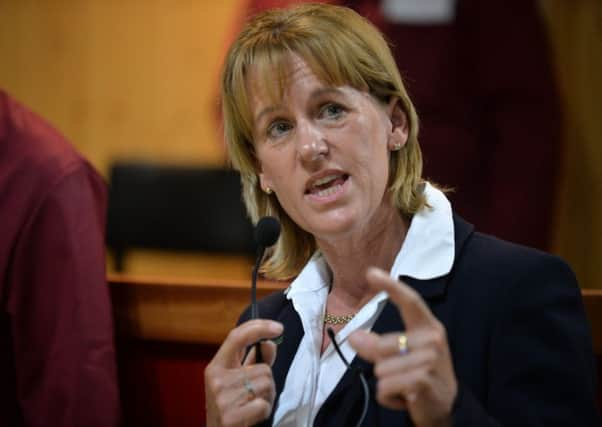Learning from the drought


It published a document this week setting out measures it said would help move towards a more resilient farming sector and food system and which “must be implemented urgently” to combat extreme weather events.
They include tax incentives to encourage investment in farm reservoirs, and “more crop per drop”; farmed environment schemes to encourage water efficiency.
Advertisement
Hide AdAdvertisement
Hide AdThe union is also calling for a national system of “managing water scarcity where food production is recognised as a priority user”, and it wants to see new policies that would support farmers in managing the impacts of weather and market-related volatility.
The document, published to coincide with Farmers’ Day at the UN Climate Change Conference in Poland, says farmers are still struggling with the aftermath of the hot, dry summer that followed a cold, late spring, and are planning for 2019 “with some trepidation”.
It says: “Learning lessons is critical so our food supply can be more resilient, and our farmers can better manage the volatility of an uncertain climate in future.”
The NFU president, Minette Batters, said: “This unprecedented spell of weather really should be a wake-up call for us all. It’s a timely reminder that we shouldn’t take food production for granted.”
Advertisement
Hide AdAdvertisement
Hide AdThe report warns that the full impact of this year’s weather extremes will not be known until next year.
It says: “Many farmers were saved just in time by a rainy spell, but such ‘near miss’ summer droughts expose the vulnerability of the UK’s farming sector, much of which relies on regular rainfall rather than on storage, to meet crop and animal welfare needs.
“This places our sector in sharp contrast to other water users.”
Ms Batters said the drought “caused crop yields to become increasingly unpredictable, lower quality in fruit and vegetables, a severe lack of feed and bedding for livestock, interruptions to vital water supplies and an increased risk of fire”.
Advertisement
Hide AdAdvertisement
Hide AdShe said: “Our industry is on the forefront of climate change impacts and producing safe, traceable and affordable food is a daily challenge for UK farmers.
“The lessons we have learned clearly identify what policies need to be in place to manage market failure and volatility. This must be treated seriously, alongside productivity and delivering for the environment, in order to provide a supply of home grown food and to deliver food security for the nation.”
At the NFU’s “drought summit” in August, the Environment Secretary, Michael Gove, promised “to do whatever it takes” to deliver “maximum flexibility”.
The union says it has since been working closely with the Government and its agencies to alleviate the effects of the drought, and will continue to monitor for potential drought next year.
Advertisement
Hide AdAdvertisement
Hide AdBut its vice president, Stuart Roberts, said it was “frustrating” that the Government had yet to confirm the availability of bridging payments within the Basic Payment Scheme, in 2019.
He said : “Settling outstanding BPS monies over the summer and securing the prompt delivery of 2018 payments this winter have been vital to ease real cash flow pressures on farm.”
The weather is said to have contributed to an increase in cow slaughtering of more than 30,000, and to 1m fewer lambs than last year.
But the report says cooperation between farmers and the authorities had often prevented further hardship.
Advertisement
Hide AdAdvertisement
Hide AdStaffordshire potato grower Richard Thompson praised the Environment Agency for releasing water from a neighbouring farm which saved his crop from being written off.
He said: “A simple water trading scheme can be transformational, especially if it allows water sharing before the situation becomes an emergency.”
And in the Peak District, livestock farmer Barry Wager, who lost a quarter of his silage crop and 40 per cent of his hay, said a relaxation had helped save the rest.
He said: “I could just see the standing grass wilting away and I had to get a derogation to cut it early before it all vanished”.
Advertisement
Hide AdAdvertisement
Hide AdMr Wager said he had already spent £7,000 on straw with another £10,000 earmarked for more feed to get through the winter.
The NFU deputy president, Guy Smith, said: “This shows what farmers can do when Government and its agencies are actually proactive and flexible and make decisions at speeds appropriate for farm businesses. If only this had happened across the board.”